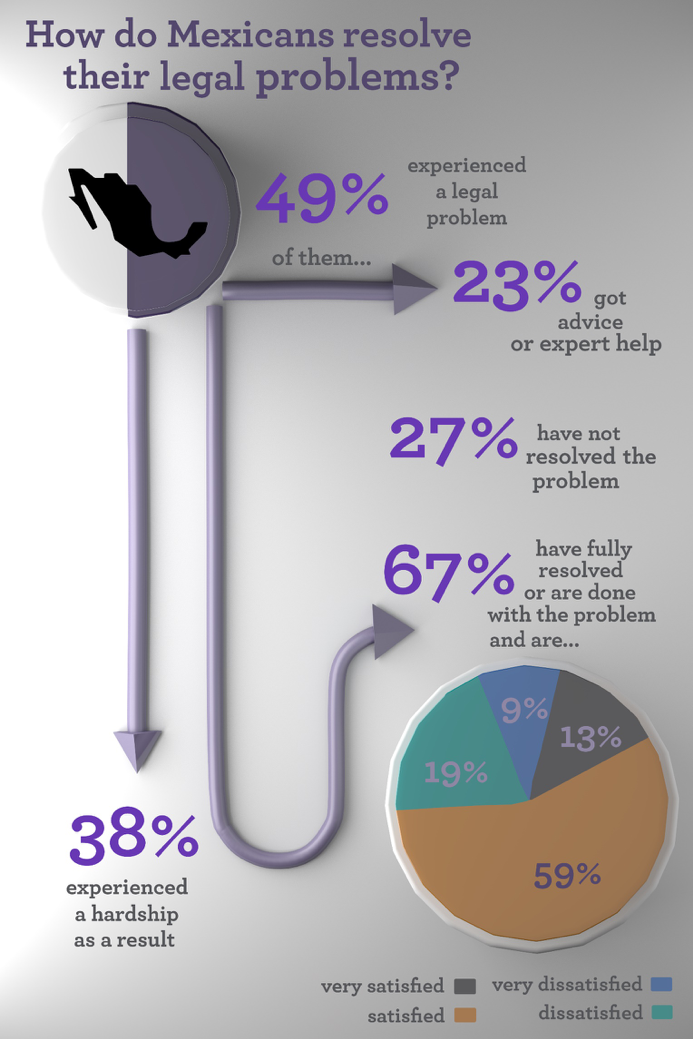*This blog post was originally published on the #JusticeForAll global campaign website, as part of 10 Weeks of Action: Demanding funding and protection for grassroots justice defenders by calling on our community to sign the #JusticeForAll petition.
Half of Mexicans Experience Legal Problems, Only 1 in 4 Get Help
As part of a large-scale study to understand how the rule of law is experienced across Mexico’s 32 states, the World Justice Project (WJP) surveyed more than 25,000 households in the fall of 2017. This General Population Poll (GPP) included a module on access to justice, allowing the WJP to gather data from ordinary citizens on their legal needs and approach to navigating everyday legal problems. At first glance, the study found that everyday legal problems are ubiquitous, and that most Mexicans do not turn to lawyers and courts to resolve their problems.
Legal Problems in Mexico
The results show that nearly half of Mexicans (49%) have experienced a legal problem in the past two years.[1]Consumer issues were the most common legal problem, with 25% experiencing a problem related to poor professional services and obtaining reimbursements for faulty or damaged goods, as well as disruptions in the supply of public services. Housing issues were the second most common legal problem, with 20% experiencing legal problems relating to landlords, tenants and neighbors.
On the other hand, issues with law enforcement and accidental illness and injury were among the least common legal problems. 2% of those surveyed reported being beaten or arrested without justification by a law enforcement officer, and 6% reported injuries or health problems caused by work accidents or inadequate medical treatments. Despite the low incidence of these types of legal problems, these numbers are concerning in light of the severity of these issues and their impact on millions of Mexicans.
Navigating Legal Problems
The results of the survey show that many people’s approach to resolving their legal issues does not involve lawyers and courts at all, with most respondents preferring to seek help from a family member or a friend, or to work out the problem directly with the other party. Only 23% of those who reported a legal problem sought advice or legal representation. The most common sources of help were lawyers or legal advice services (36%), followed by relatives, friends or acquaintances (27%) and government legal aid offices (11%).
Those who did not seek advice or legal representation cited different reasons for not doing so. Nearly a quarter (23%) felt that their problem was not important or that it was easy to solve, while 20% said that they did not believe they needed any advice. The data also show that while most respondents were able to resolve their problem, many remain unresolved or are in the process of resolution. More than half (57%) resolved their legal problem, but 27% stated that their problem is ongoing and 10% reported that their problem persists, even after the resolution process. What’s more, 28% of respondents were dissatisfied or very dissatisfied with the outcome of the resolution process, while 72% were satisfied or very satisfied with the outcome.
Problem Impact
It is crucial to understand ordinary people’s legal needs and experience accessing justice, as legal problems also have profound impacts on people’s lives, especially on their health and financial stability. Indeed, 38% of Mexicans reported experiencing a hardship as a result of their legal problem.Specifically, 22% reported loss of income, financial problems or the need to relocate, while another 22% reported a stress-related illness or other health problem. Moreover, 10% reported a relationship breakdown and 2% reported abusing alcohol or drugs as a result of their legal problem.
The data also show that the impact of legal problems varies between men and women, with 40% of women reported a hardship because of their legal problem, as compared to 35% for men. The greatest difference relates to health, with 27% of women reporting stress-related illness or physical ill health, as compared to 17% for men – a difference of ten percentage points.
About the WJP’s Access to Justice Study
The dispute resolution module of the World Justice Project’s General Population Poll (GPP) used to collect these data was administered in Mexico in the fall of 2017. This study builds on the WJP’s Global Insights on Access to Justice study, which was the culmination of an extensive two-year pilot and vetting process, and reflects the consultations of governments, multilaterals, local civil society organizations, and academics from 17 countries.
While Mexico was also included in the global study, which presents data from 1,000 respondents in the three largest cities of each country, the Mexico-specific study goes further, gathering data from more than 25,000 households at the state level and including both urban and rural households. This article is a preview of a full report on access to justice in Mexico to be published in the late fall of 2018.
In addition, the WJP will be publishing the first-ever Mexican States Rule of Law Indexin September, featuring data and insights organized around eight factors of the rule of law across all 32 states of Mexico. For more information about these forthcoming reports, please visit https://worldjusticeproject.mx/indice/2018/.
[1] Results exclude the state of Coahuila. Access to justice data for Coahuila will be available in 2019.





